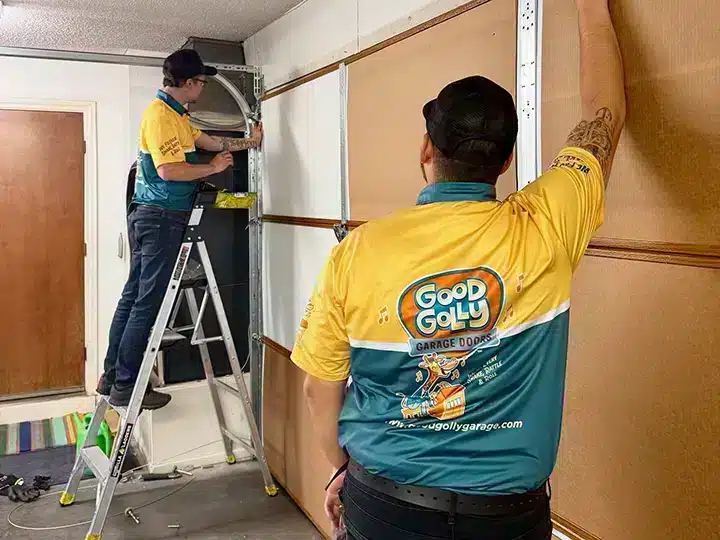7 Garage Door Noises You Shouldn’t Ignore—and What They Mean
Expert Garage Door Services Powered by Good Golly Garage Doors

If your garage door is starting to sound more like a haunted house than a reliable entry point, you’re not alone. Homeowners across Austin hear strange garage door noises all the time—grinding, banging, squeaking—and often assume it’s nothing to worry about.
But the truth is, garage door noises are usually signs that something’s off. Whether it’s a worn spring or a misaligned track, catching these issues early can save you from bigger (and more expensive) repairs down the line.
Below, we’ll walk through the 7 most common garage door noises, what each one usually means, and when you should bring in a pro.
default-phone-number1. Grinding = Worn rollers or misaligned tracks
That low, gritty grinding sound when your door moves is often the result of metal rollers scraping along misaligned or dirty tracks. In Austin, where dust and humidity can gunk up hardware quickly, this is a common issue.
Try cleaning the tracks and applying a silicone-based lubricant. If that doesn’t help, the rollers may need to be replaced—or the tracks may need adjustment. For persistent grinding, professional garage door track repair is the next step.
2. Squeaking or screeching = Dry hinges, rollers, or springs
High-pitched squeaking is one of the most recognizable garage door complaints—and one of the most preventable.
This noise usually comes from dry metal components rubbing together. Apply lubricant to the rollers, hinges, and springs a few times per year to reduce friction and extend their lifespan. If you’ve already tried that and the noise won’t go away, consider booking a garage door maintenance visit to catch deeper wear and tear.
3. Rattling = Loose hardware or opener mounting
A rattling door can sound like it’s falling apart, but it’s often just a matter of loose nuts, bolts, or mounting brackets.
You can tighten visible hardware with a socket wrench, but don’t go overboard—over-tightening can strip the threads or damage components. If the rattling continues or seems to be coming from the opener itself, a technician can inspect the unit during a general garage door service in Austin.
4. Popping = Spring tension issues
A popping sound when your garage door opens or closes may be caused by torsion springs that are expanding or contracting unevenly. Austin’s changing temperatures—from sticky heat to cold fronts—can put stress on these springs.
Because garage door springs are under high tension, this isn’t something to troubleshoot yourself. If you hear popping or suspect your springs are wearing out, it’s safest to book a spring repair appointment with a trained pro.
5. Thudding or slamming = The door is off-balance or cables are failing
If your door hits the ground hard when it closes, or slams shut suddenly, the problem may be an unbalanced door or failing cables. This not only wears out components faster—it’s also a safety hazard.
Don’t keep using the door until it’s fixed. Schedule a garage door cable repair to prevent further damage or injury.
6. Humming or buzzing = Opener problems
A constant humming or buzzing noise from your opener motor could indicate that it’s straining—or stuck. Sometimes it’s as simple as an obstruction in the door’s path or a remote issue. But if the motor continues to run without the door moving, it could be a sign of internal failure.
If your door is slow to respond or stops halfway, get your garage door opener looked at before it burns out completely.
7. Whistling = Air leaks and worn weather stripping
That eerie whistling or whooshing sound during windy days? It often comes from air sneaking through worn or cracked weather stripping.
Besides the noise, this kind of gap lets in dust, moisture, and even pests—especially during Austin’s stormy spring season. Inspect the rubber seal along the bottom and sides of your garage door. If it’s brittle or missing, weather stripping replacement can solve the issue fast.
DIY fixes vs. Calling a pro
A few of these noises—like squeaks or minor rattling—can often be resolved with a little lubrication and a wrench. But when it comes to issues involving your springs, cables, opener, or overall balance, don’t risk it.
Some garage door problems can be dangerous to fix on your own. If you’re unsure what the sound means or it keeps coming back after basic maintenance, book a professional garage door repair in Austin, TX.
Need a new door entirely? Austin’s climate can be tough on older garage doors, and sometimes a replacement is the smarter long-term choice. Explore your options for garage door installation with us.
Book a free inspection in Austin, TX
Whether your door is buzzing, banging, or just sounds off, we’re here to help. At Good Golly Garage Doors, we’ve seen—and silenced—every kind of garage door noise out there. We know how Austin weather impacts your system and how to keep it running quietly and reliably.
Schedule your inspection today and let’s get your garage door back to doing its job… quietly.
default-phone-number



